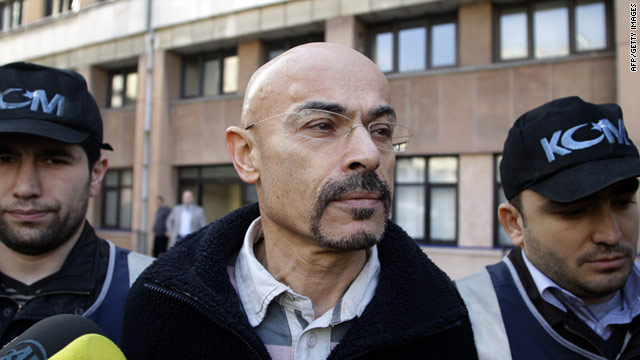Turkish doctor suspected of human organ trafficking arrested
January 12, 2011 10:19 a.m. EST

Yusuf Ercin Sonmez was arrested on suspicion of involvement in an international human organ smuggling ring.
RELATED TOPICS
A Turkish doctor arrested in an investigation into an alleged human organ smuggling ring protested his innocence Wednesday.
"There is no such crime. There is no organ trade," Yusuf Ercin Sonmez told reporters outside a courthouse, according to Turkey's semiofficial Anatolian news agency. "There can't be evidence for something that doesn't exist," he added.
He was arrested Tuesday in Istanbul's Kartal district, an officer with the financial crimes department of Istanbul Police told CNN.
Sonmez, 53, was the subject of an Interpol arrest warrant issued by the District Court of Pristina in Kosovo. The offenses listed by Interpol: crimes against life and health, people smuggling, trafficking and illegal immigration.
.
Sonmez was questioned by a prosecutor for about two hours Wednesday, then sent to a criminal court "with the prosecutor's demand for his arrest for 'organized organ trading,' " the Anatolian news agency said. Sonmez was then released by the court pending trial.
Last month, European authorities charged in a report that executives who control Kosovo may have stolen organs when the Kosovo Liberation Army was fighting Serbian forces in the late 1990s.
Kosovo Prime Minister Hashim Thaci called it "a political accusation based on no facts or proof" and "pure fabrication."
The report said Thaci, a former leader of the Kosovo Liberation Army, was the "boss" of a prominent faction in the militia that "apparently wrested control" of "illicit criminal enterprises" from rivals across the border in Albania.
"Numerous indications seem to confirm that ... organs were removed from some prisoners ... to be taken abroad for transplantation," read the report. It suggested that illegal organ trafficking continued after the war ended.
Thaci said in December that he was looking into all legal and political possibilities to correct what he saw as the report's inaccuracies.
Dick Marty of the Council of Europe, author of the draft report, said nearly 1,900 people who disappeared during the conflict still have not been found, and another 500 disappeared after NATO troops arrived in June 1999.
.
The report is based partially on investigations by European Union officials and was written for the Council of Europe's Committee on Legal Affairs and Human Rights.
European Union officials in Kosovo have said that anyone with concrete evidence of war crimes or organized crime should come forward.
Kosovo was a province of Serbia but declared independence in 2008. About 70 countries have recognized the declaration, but Serbia does not, and international organizations including the United Nations and the European Union continue to have administrators in Kosovo.
The Council of Europe, an organization with 47 member countries, seeks to promote democracy and human rights.
CNN's Yesim Comert in Istanbul and Journalist Vlora Rustemi contributed to this report.

No comments:
Post a Comment